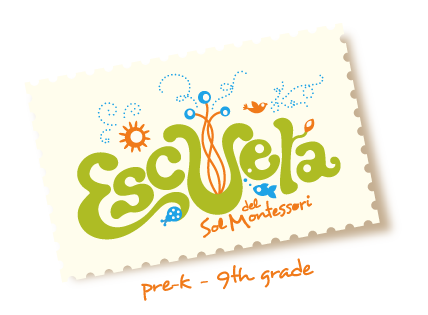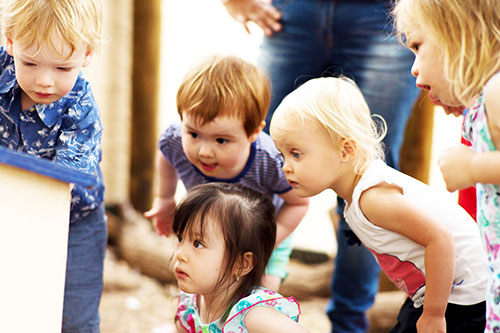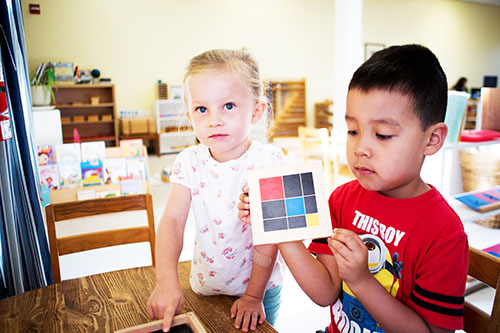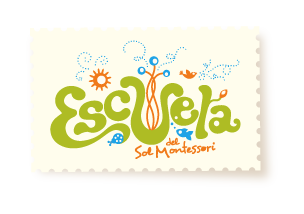By Emily Schuyler, Montessori Guide
Starting school is one of childhood’s most memorable milestones, for parents and students alike. This monumental moment comes with a range of emotions including excitement, joy, pride, nervousness, and sometimes even sadness. As children and parents face the transition from a home setting to a school one, there are many new things to experience and learn. Learning to separate is one of the first meaningful and empowering skills your child will learn as they start school. For parents, putting the care of your child in the hands of another adult is an act of trust and strength. For children, it is a lifelong skill that will help them to deal with countless other transitions in life ahead. While it is challenging for most of us, our experts on staff have decades of collective experience supporting children as they embark on their school adventure. Here are some important tips to make saying goodbye at school easier and more successful!
Establish a goodbye routine ahead of time
Young children thrive on routine, it helps them to feel safe and secure. Children under the age of six are still developing a sense of time, and may not be able to imagine what the future holds. You can support your child by painting a visual picture verbally, and following the same steps every day. You might say something like, “Tomorrow is a school day! We will get up, have breakfast, and go to school. I will go to work (or wherever else you are off to do – go to the store, the library, etc.) and you will go to school. There will be lots of new things to see and kids to meet. I will pick you up after lunch (or nap, or extended day.)” Time is abstract for young children, so naming the event that happens before pick-up is the most concrete way for them to understand when you will return.
Make your Goodbye Prompt and Positive
Say goodbye in a clear and positive manner; make sure your child knows you are leaving. It can be tempting to leave while your child is happily engaged with others, but this can cause anxiety for them when they realize you are gone. Giving a simple message like, “Goodbye! I hope you have a great day; I love you!” will let your child know that you believe in them and you know they are in a safe space. When your child feels you trust their guides, it sends a signal that they can too! Avoid asking permission to leave or lingering, this prolongs the transition for your child (and you) and can create a feeling of unease. As long as you stay, your child will not be able to end their transition and move on to the school day – so prolonging a goodbye makes the hardest part last longer! If you are having a hard time leaving, remember that you can call the school 15-20 minutes after drop-off to make sure your child is doing okay. Chances are, they have settled within a few minutes.
Be on Time
Young children move to their own rhythm, so provide as much extra time as you can to help them get ready for the day. Remember that consistent routine is one of the most reassuring things you can provide, and helping your child to arrive at the same time as their classmates is a great way to support them. Planning what clothes to wear and the breakfast menu the night before can help you to get out the door on time! If your child has a hard time getting in the car, try a fun children’s playlist for the ride or a favorite book to look at on the drive. Picking up promptly at the scheduled time at the end of the school day will also help your child to feel secure that you will return each day, and to establish a daily routine.
Trust your child’s guides
Your child’s well-being and happiness is the foremost goal for every member of our staff! While it can be challenging to leave your child with a new adult who you are still getting to know, each person at Escuela loves working with children and wants to provide a safe, beautiful, happy space to learn and grow. Our lead guides are highly trained and engage in lifelong learning to provide the best education and support for your children. We are trained to offer a variety of support strategies to help your child adjust; guides may offer them a hug, show them an exciting new activity, stay close by, or help them connect with another child. If you want to know more about what works for your child, reach out to their teacher for more information about the routines in their specific classroom.
Acknowledge your child’s feelings – and your own
Many emotions may come up as you and your child get used to going to school. You can help your child to label their emotions and model expressing your own. You might say things like, “I know it is hard to say goodbye; it’s okay to feel sad when I leave, that happens to me too, but I know we are both going to have a great day today and I will see you soon!” Learning to cope with small moments of sadness, and how to help yourself feel better in these moments, is a critical skill that will last a lifetime. You might model this for your child by saying to your child, “When I feel sad, I like to look at a book.” or “Sometimes drawing helps me to feel better when I am upset.” Talk to your child’s guide about calming strategies they could use at school that you can suggest to your child when having these discussions.
Ask for help
Sometimes stepping back from the drop-off routine can make a huge difference. Children may have easier drop-offs with one parent or another. You could also try having another relative, close friend, or grandparent drop off for a few days; this can help you and your child to reset when things aren’t going smoothly.
Stay calm and enthusiastic.
Remember that you are your child’s greatest teacher. They will look to you for guidance as they set their outlook toward school. Talk about how much fun school will be, talk about their friends and classmates. Discuss their favorite activities and share how happy you are that they have such a special school. Young children may have a hard time sharing the highlights of their day – they often remember and share whatever happened immediately before pick-up – so reach out to their guides if you have questions about their day. Reminding them of their favorite moments, friends, or activities is helpful as you look forward to the day ahead. Modeling calm is important, as your children will pick up on your emotions.
Be aware of the honeymoon
Some children feel excitement and separate easily at the beginning of school, and then suddenly have more trouble 2-3 weeks into the year. Like children who have trouble separating at the start of school, this is a normal developmental occurrence, and doesn’t mean that something is wrong. Reach out to your child’s guides and keep them informed if you feel your child, or you, needs additional support.
Know that your child is in excellent loving care!
Dr. Maria Montessori said, “To understand the needs of the child and to supply these so that his life develops fully, that is the aim underlying my method.” At Escuela Del Sol Montessori, we take this mission very seriously! It’s our Nature to Nurture!






